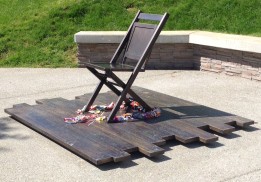ANCESTRAL VOICES IN MY HEAD
I have these voices in my head. You know the ones I mean. Right?
(Please tell me that you do.)
Mine mostly entail shoulds and oughts and shames. Judgement. I’ve spent years in therapy, meditation, and prayer, and many hours in recovery programs for dysfunctional families, trying to rid myself of these voices.

Before that, I just drank and did drugs and overworked, trying to quiet the unacknowledged chattering. As long as I had a romantic partner, I could throw myself into the drama of trying to fix them and “us” instead of noticing the voices in my head. As long as I was an environmental lobbyist, I had a whole planet to save. Who has time for self-awareness?
I was oblivious to the submerged script that directed my life, causing me to make unwise choices and judge others and numb in any way I could.
I coped. I was OK. I didn’t always feel good about myself, but I was OK.
When I began my journey of spiritual and emotional healing, I finally started to hear the voices. I did not hear them in an auditory sense, but their words were clear and loud: “What is wrong with you?” “Why are you are so stupid?” “I can’t believe you did that!”
They were regular and insistent and alarming. Who talks to someone like that?
Well, as it turns out, everyone in my family did.

Family Voices
“Whose voice is that?” my therapist would ask. And I’d close my eyes and try to pinpoint it. It was often my mother, my sister, or my brother. They weren’t unloving people, they were just responding to the harsh and commanding voices in their own heads, I guess. It pains me now when I hear families talk to each other like this because I know it’s being internalized, especially by the youngest ones.
These are ancestral voices, passed on through generations. When I trace mine back as far as I’m able, they belong to my grandmother, born Zillah but called Beedie. Her judgmental voice haunted my mother, who passed it on to my older sister and brother.
It’s not Beedie’s fault. Someone talked to her that way. She grew up highly privileged, the daughter of a wealthy diamond mine magnate in South Africa, surrounded by servants and governesses and nannies. Of course she had a strong sense of the way things ought to be and the way people ought to act. They ought to act like wealthy British imperialists, better than everyone else.
And so when I don’t measure up to Beedie’s standards, the critical voices kick in. The underlying “truth” of all the negative voices is “You are not good enough.”
I imagine she felt the same way, or she would not have internalized the judgement and passed it on.
Placing the Blame
Of course when you find someone else’s voice in your head and it’s been hounding you as far back as you can recall, you get angry at them. You need to blame someone for your own brokenness. It’s my family’s fault! It’s that kindergarten teacher’s fault!
The problem with blaming someone else is that it disempowers you. You give away your power of recovery to someone else, and you get stuck. Might as well pour another Scotch, I can’t get these voices out of my head anyway.
The other day my therapist asked me what I would say to Beedie if she were here today. And I said without hesitation: “You are dead and I am still alive.”
She has lived her life with her voices. I still have a chance to heal and become more whole. In fact, that’s a good way to honor those who have come before us.
Birthday Blessing
Today is my grandmother’s birthday. She was born on February 15, 1889 in Johannesburg, Gauteng, South Africa. In honor of Beedie, I’ve decided to let go of the blame and negativity that I’ve held. I release her judgements and her critiques — I don’t need them. Instead, I choose to think of her with compassion and love. I want to remember her true, best self.
Happy birthday, dear Beedie. Thank you for your sense of humor and absurdity and fun. Thank you for your love of animals and flower gardens. Thank you for your small kindnesses (often involving chocolate) and for passing on your appreciation for “a proper cup of tea.” Thank you for holding to your values and always doing what you thought was right.
You were a strong woman, Beedie; you were courageous. Your best friend was murdered by Zulus when you were a child; you lost your own little boy; you lost your husband’s love to his philandering and then his young life to a ship fire; you lost your fortune and lived in poverty but kept your family together. Gangrene stole your ability to walk and dementia stole your ability to think.
Nevertheless, you persisted.
Thank you for being who you were, Beedie. Thank you for being an example. I treasure the day that you were born. I love you.
♥♥♥
Thanks for the WordPress prompt: sound























